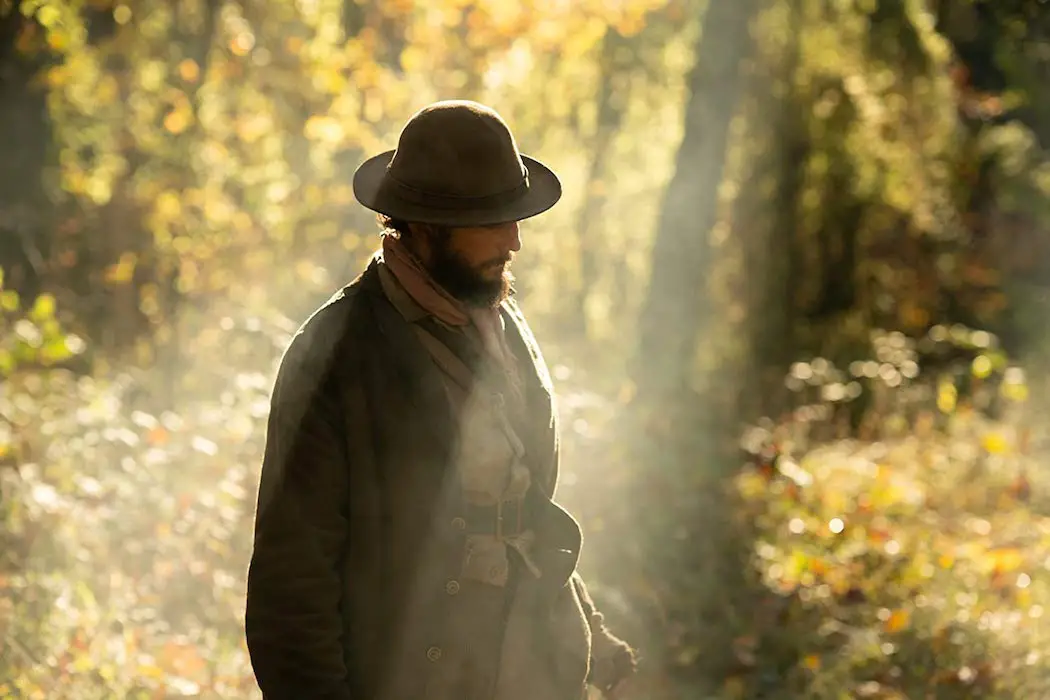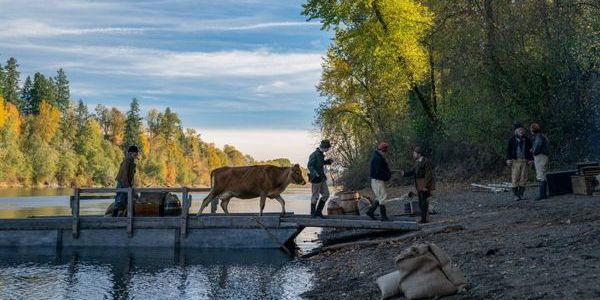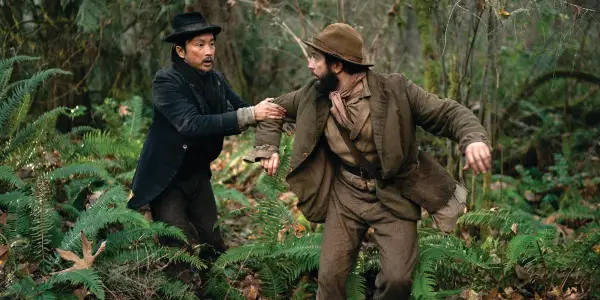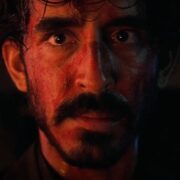FIRST COW: Capitalism & Its Gatekeepers

I used to work in politics but film has always…
Kelly Reichardt has always had a keen awareness of a changing American landscape. Her vision of the American West has real historical and political depth, most of it examined solely from a contemporary perspective. In her most recent feature, First Cow, she steps further back in time than ever before to track the origins of a particular history of America.
That perspective has often been laden with responsibility, such as in her 2006 breakout Old Joy; her previous film Certain Women; even danger, as in her direct and thrilling Night Moves; and the bleak mood piece, Meek’s Cutoff (her only other period film). But in First Cow, Reichardt presents a version of America on the precipice of modernity, and there is an undercurrent of expectation and anticipation in the air.
Based on a novel, The Half Life, by Reichardt’s frequent writing partner, Jonathan Raymond, First Cow is right at home in Reichardt’s filmography. Her distinct, delicate voice, articulated tonally and visually through a mix of geographical grandeur and interpersonal intimacy, is just as prominent here as in her other work.
The film opens on the present day, somewhere in the Pacific Northwest, where Reichardt has based many of her films, as a steamboat penetrates the frame. The Pacific Northwest is both pristine and rugged in Reichardt’s films, yet here, the ship tinges this perception with the regret of lost vitality, of tainted virginal beauty. Indeed, the opening scene of a nameless young woman (Alia Shawkat) and her dog picking over the sparse riverbank for mushrooms, and the gradual unearthing of two buried skeletons, is the film’s subdued warning that what we will very soon see is a thing of the distant past.
Intimate Relationships on the Frontier
First Cow’s primary focus is on the friendship and economic exploits of Cookie Figowitz and King Lu, two unlikely friends who, through happenstance and a little bit of luck, become the Oregon Territory’s savviest capitalists. Cookie (John Magaro), as his name suggests, is the cook for a miserable crew of fur-trappers who, despite his literal life-giving services, don’t appreciate his presence on the trail. When he happens upon King (Orion Lee), crouched naked in the forest brush, their relationship takes on a rapid platonic intimacy, informed by the implicit understanding of their outsider statuses.

After their first, brief encounter, during which King spends the night in Cookie’s tent and absconds early in the morning, they are reunited in a small frontier town, Cookie now extricated from his crew, and King now fully clothed and back on his feet. Through both of their experiences, King as a political outsider, Cookie as an emotional one, Reichardt once again displays her generous understanding of life on the margins, and the implicit need to create relationships in the harsh lands that are always seeking to tear you down.
Immediately the two fall into a domestic rhythm. They share King’s homey cabin on the outskirts of town, Cookie at once making himself at home by sweeping the floor and putting flowers in a vase while King chops wood outside.
Reichardt’s camera is incredibly gentle when focused on Cookie and King as a couple. It never overexerts itself in trying to find or match their pace; in fact, their pace and the cameras are inextricably linked. Instead, Reichardt happily perches it in one spot and allows their actions to flow in and out of the frame. Though romance is never depicted or even implied, there is a powerful intimacy between them that grounds their scenes together in a sleepy, contented warmth.
In these moments, First Cow bears a remarkable resemblance to Reichardt’s breakout feature Old Joy. Both films depict straight male friendship that isn’t entirely straight. Though hidden or long-dormant queerness is not explicitly discussed, the relationship in First Cow has a rapid intimacy that admirers of Reichardt’s work will immediately recognize from her earlier film, though it plays out almost in reverse. For the friends in Old Joy, their history informs a shockingly intimate climax; in First Cow it was their rapid bond that precedes a gentle end.

In the midst of this domestic bliss, a new force arrives in town; that of the frontier’s first-ever cow, and the new property of the town’s Chief Factor (Toby Jones). Cookie remarks that he would love to use its milk to bake all sorts of confections he hasn’t been able to with only the most basic ingredients at his disposal. The industrious and entrepreneurial King sees an opportunity and convinces Cookie to bake and sell cakes in town with milk stolen from the cow.
Taking Capitalism To Task
If First Cow isn’t totally an indictment of capitalism, it certainly saves that energy for its gatekeepers. Reichardt sees the emergence of capitalism, on one hand, as a good thing, the lubricant for a beautiful, deep, and tender friendship; the communal effect Cookie’s delicious cakes have on the town’s residents is evidence enough that within the confines of a makeshift bake stand, these economic forces do far more good than harm.
And this isn’t limited to the indirect impacts, either. Its explicit intentions, too, are rooted in the prospect of the American dream, something that was the natural and expected endpoint in early America. It’s why King’s imaginings of a new life in San Francisco with Cookie, opening up a hotel and bakery, don’t seem that far fetched. But when the Chief Factor and his visiting commander discover Cookie and King have been stealing the cow’s milk, the once gracious reception of their cakes turns to violent persecution and puts a sudden and unexpected roadblock in front of King and Cookie’s plans, and to the film’s formal structure.
One of the nice surprises of First Cow is how it subverts expectations of the genre. It’s why comparisons with Robert Altman’s McCabe & Mrs. Miller are so interesting and relevant. Both have some commentary to make on the Western genre, particularly the trope of the troublemaking outsider (Big businessmen in McCabe, and Evie the cow and the Captain in First Cow).

It also subverts structural and narrative expectations. First Cow’s runtime suggests, or maybe has the potential for, narrative heft. Two hours isn’t an epic, but it’s a lot of real estate to take up. And the film hints that the story will go beyond the small town where Cookie and King start their enterprise (Raymond’s novel, ironically, is a years-spanning, continent-trekking epic).
Instead, it surprises you by staying where it is. It introduces a fascinating halting, if not reversal, of course, a formal subversion that sneaks up on you quickly. The final twenty minutes of the film seemingly appear out of nowhere, and you have no choice but to realize Cookie and King aren’t going to go to San Francisco and start that bakery they talked about.
Just like the finale in McCabe & Mrs Miller places the moral and physical consequences of greed and progress right in front of you, so do Cookie and King’s deaths comment directly on the fortunes of capitalism. King might have known deep down that Cookie wouldn’t last the night in the cold with his head wound suffered from the Chief Factor and Captain’s pursuit, but he certainly didn’t know that another force was lurking in the shadows to take him out as well.
While it maintains Reichardt’s delicate, intimate mood, the final moments of First Cow are still a microcosm of the film’s overall formal structure: it leads you in one direction, but in the blink of an eye halts your momentum and snaps you back into reality, one Reichardt had shown you from the very beginning. First Cow shows Kelly Reichardt at the height of her artistic and political powers, with supreme command over her own personal vision of American progress and its consequences.
What are your thoughts on First Cow? Let us know in the comments below!
First Cow is now streaming on VOD.
Watch First Cow
Does content like this matter to you?
Become a Member and support film journalism. Unlock access to all of Film Inquiry`s great articles. Join a community of like-minded readers who are passionate about cinema - get access to our private members Network, give back to independent filmmakers, and more.
I used to work in politics but film has always called to me. Now I'm putting my love of the art form to use! I love social thrillers, coming-of-age tearjerkers, and pitch black comedies. The Coen Brothers, Olivier Assayas, Ingmar Bergman, Kelly Reichardt, and Andrew Haigh speak to me on a spiritual level. Enjoy!













